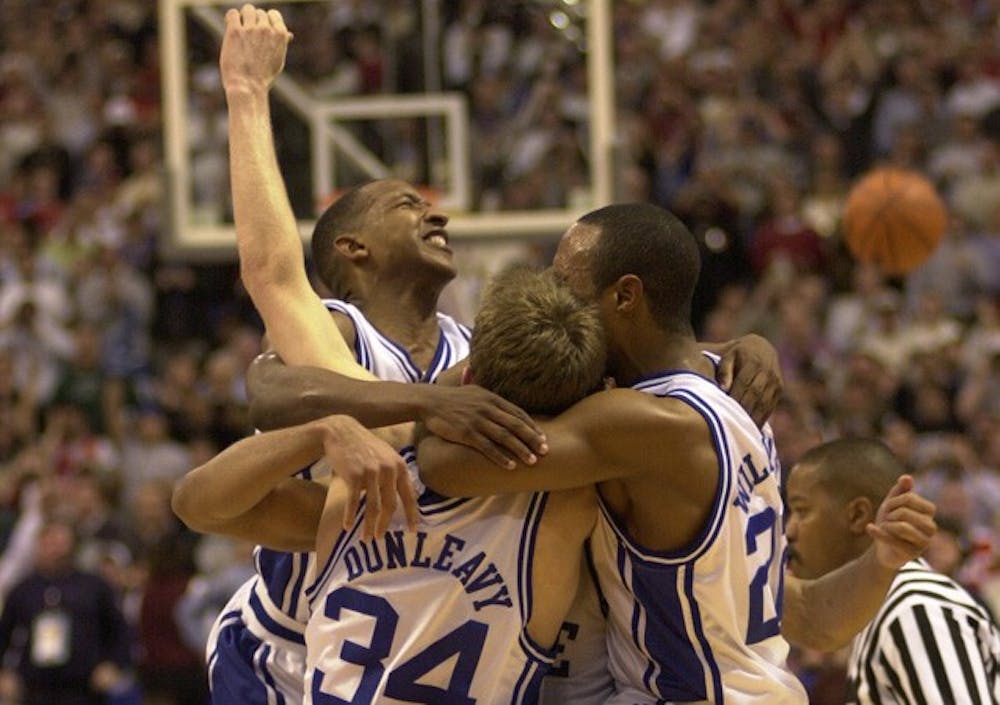Brody Greenwald was The Chronicle’s sports editor in 2001, and he covered both of Duke’s Final Four victories that season. Below, he recounts the 2001 Blue Devils’ run to the national championship, the program’s most recent title.
Just before tip-off of the 2001 Final Four at the Hubert H. Humphrey Metrodome in Minneapolis, Minn., I asked John Feinstein, the author of the two best-selling sports books in history and a former Chronicle sports editor, to write a column for a commemorative issue if, and when, Duke won the national championship. Feinstein stared at me incredulously. He then muttered something about jinxes and said, politely, that we could talk again after all the games were over.
Feinstein’s caution was justified. Although that Duke team had a roster full of NBA-caliber talent with Shane Battier, Jason Williams, Mike Dunleavy, Carlos Boozer and Chris Duhon, and although that squad was the first in Duke history to win all of its NCAA Tournament games by double-digit margins, the Blue Devils had begun the month of March as significant underdogs to win an ACC championship, let alone a national title. The ensuing championship run was so improbable and the team’s resilience so great that, in our year-end editorial, The Chronicle described the 2001 team as one “for all seasons,” and praised coach Mike Krzyzewski for his “best post-season coaching job in 10 years.”
Multiple injuries could have derailed the team. In late January, Williams reinjured his sprained ankle when he landed on a teammate in practice. Although the star point guard scored eight points in 13 seconds in the “miracle minute” win over Maryland in College Park several days later, Duke lost three of its next nine games, including a rematch against Maryland in which Boozer fractured the third metatarsal in his right foot. With one game remaining before postseason play, most critics, including those with Duke ties, suggested the team was done. The Chronicle picked North Carolina to win the season-ending showdown at the Dean E. Smith Center, and Feinstein told a national TV audience that the Blue Devils would be lucky to reach the Sweet 16 of the NCAA Tournament. As Feinstein later recounted for The Chronicle in its NCAA Championship Commemorative Edition, he “didn’t see how a team that appeared to have no inside presence could get to the Final Four.”
After Boozer’s injury, Krzyzewski rotated three unheralded post players—Casey Sanders, Matt Christensen and Reggie Love—and replaced two-year starter Nate James with Duhon. With its new starting lineup, Duke blew out North Carolina twice in one week, first to claim a share of the regular season conference title and then in the ACC championship game.
“No one really gave us a chance,” Battier said at the time.
As a No. 1 seed for the fourth consecutive season, Duke swept through the East Regional and into the Final Four on the identical Greensboro-to-Philadelphia-to-Minneapolis itinerary as the 1992 championship team. Boozer returned to the team in a reserve role in the regional semifinals. Still, the Final Four presented a new set of challenges, beginning with the fourth installment of the heated rivalry that season with Maryland. The Terrapins had not only won in Cameron Indoor Stadium two years in a row, but had also held double-digit leads in their two losses to Duke that season.
After 13 minutes, Maryland led by 22 points, 39-17. On press row, the murmurs were audible. On the floor, Krzyzewski tried to loosen up his players.
“You’re losing by so much, you can’t play any worse,” he told them during a timeout. “So what are you worried about—that we’re going to lose by 40?”
At halftime, Duke still trailed by 11, and no team had overcome a halftime deficit that large in an NCAA Tournament semifinal game. Then, after the Blue Devils had finally edged in front late in the game, Duhon lunged for a steal, collided with Maryland’s point guard and landed flat on his back and head. While Duhon was laid out for several minutes with his second concussion in a month, Battier told his teammates, “The time is now.” The 95-84 win that night was one of the most dramatic comebacks in Final Four history. Two nights later, Duke was the national champion.
Battier went on to be picked sixth in that year’s NBA Draft, and Williams and Dunleavy followed as the second and third picks one year later. That national championship was not won with talent alone, though. As Krzyzewski told the assembled press corps after winning his third national title, his team did it with heart and with courage, game after game, giving all of us at Duke a true team for all seasons.
Get The Chronicle straight to your inbox
Signup for our weekly newsletter. Cancel at any time.

